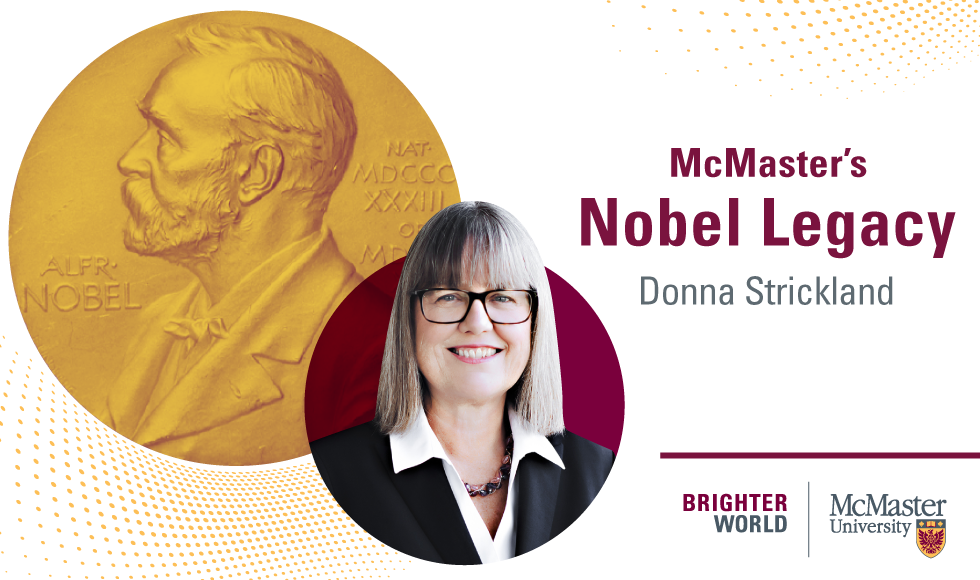McMaster’s Nobel Legacy: Donna Strickland

Lasers and time in the lab: It's important to love what you do, says 2018 Physics laureate Donna Strickland
BY Jesse Dorey
October 4, 2022
Believe it or not, Nobel laureate Donna Strickland wasn’t always set on a career in engineering.
“If you had asked me in Grade 11, I would have said I’d go to Waterloo for math,” says Strickland. Math was her favourite subject, after all.
But sometimes life has a funny way of working itself out.
Thanks to a combination of circumstance and personality, Strickland ended up changing her mind. Raised in a family of engineers, Strickland was torn between studying physics, which she came to love in school, or following the engineering path that her father and sister both walked.
Then she found McMaster University’s engineering physics program.
“When I read about one-fourth of [the program] being lasers and electro-optics — without knowing anything at all about lasers, nothing — it was a gut reaction. I just thought it sounded like so much fun.”
At McMaster, Strickland was introduced to laser physics under the tutelage of researchers Gerry Fields and Brian Garside.
Strickland would go on to graduate with a bachelor’s degree in engineering physics in 1981.
After that, she studied at the University of Rochester’s Institute of Optics. It was here that, alongside her doctoral supervisor Gérard Mourou, she discovered a way to create high-intensity laser pulses.
“Chirped Pulse Amplification (CPA) was a remarkable innovation that enabled the production of remarkably intense laser pulses,” explains John Preston, Associate Dean, Research in McMaster’s Faculty of Engineering.
CPA is the process in which beams of light are stretched, amplified and then re-compressed, creating a short but intensely powerful pulse that enables lasers to cut with precision.
“It has opened up opportunities to study light interactions at intensities and on time scales that were previously unattainable,” says Preston, a former classmate of Strickland and an expert on pulsed laser deposition.
This discovery earned Strickland and Mourou the Nobel Prize in Physics in 2018, making Strickland just the third woman to receive the award.
But did she expect to win the Nobel?
“No,” says Strickland. “Partly, I thought it was too engineering and not enough physics, but also because it’s rare to win as a woman and it’s also very rare to win as a student.”
Today, the impact of Strickland and Mourou’s work can still be seen on university campuses and in commercial businesses.
“The importance of Donna’s work has been felt in both fundamental and applied fields,” says Preston. “Numerous medical applications have been developed, both in treatments and diagnostics.”
The discovery of CPA, which happened to be Strickland’s first-ever published paper, led to groundbreaking, innovative applications in a variety of fields, from laser eye surgery and cancer treatments to the glass used on our smartphones.
Beyond commercial applications, CPA has also found its way into classrooms and laboratories around the world.
Though the lasers that Strickland worked on would have been large and cumbersome, current systems that leverage her work are compact and robust devices, allowing researchers to continue to use her discovery on a more compact scale.
“In many cases,” Preston explains, “the users likely don’t know about the origin of the laser inside their black box.”
As for Strickland, once the Nobel commitments calm down a little, the work in the lab continues. That’s where she feels the most comfortable.
“I get more than 10 times more invites than I can say yes to,” says Strickland. “But my favourite part of the job is still to go in the lab and try to get things to work.”
When it comes to advice for current and future students, Strickland likes to keep it simple.
“I think the only advice I would give is that you have to love what you’re doing,” she says.
“It’s hard to really put your heart and soul into it and do a really excellent job unless you love it, and that’s the only way I think you can really help the world.”


